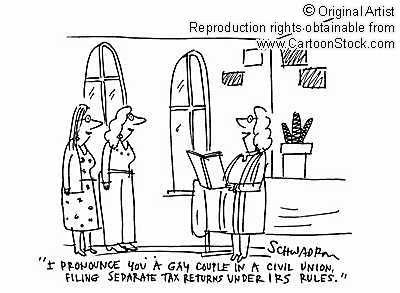
Where is the line between visual and textual rhetoric? A brief event brought this question up for me on a personal level recently.
I was on the phone with the IRS and they asked me two questions. First, is my last name my married name or my maiden name? Second, on my last return, how did I file? The answer I gave to the first was “married” and to the second was “single”. And I'm being forced to lie, or rather, to leave out part of the story. Sure, the IRS woman doesn't care--married people file single every day--but I hate it. Time after time, I have to answer questions like those the same way. I'm not single, I've been married for three years, and was with my wife for seven before that. My maiden name is my married name; my wife took my last name. D'you see? I'm a woman (if you didn't catch the byline), and I married another woman in Massachusetts before we moved to Texas. Here, I'm married only because I say so. Here, I'm “married.”
So why does this have anything to do with visual rhetoric? Because in one sense it has something very much to do with visibility. I'm not only not married because the text of many of our laws says I'm can't be, but because others' ability to picture in their heads a woman saying “My wife and I were talking the other day...” affects their ability to accept my reality. And it's my inability too: back in Massachusetts, there was a columnist—I forget the name—who wrote every so often for the back page of the Sunday magazine. The back page was on relationships, and this writer was great. Not once, but twice, I thought, “I have to remember to read this writer more often”, and when I looked for the byline, I was caught off guard both times because this person writing “My husband does this and that” was a man.
Another case of visibility--or rather, invisibility--is when I fill out a form. Just take the word “form”: there's form and then there's content, right? So the expectation of the folks handing out and filling out forms is that there will be certain predictable requests for information. We don't read forms for content—we look to see which line takes our name, whether there are brackets for our area code, and so on. The extra boxes giving us more choices to identify ourselves are equally visual arguments. If we agree you exist--Pacific Islanders, “Other” ethnicities, gays and lesbians--you get a box of your own. Again, it's about whether or not people can envision me. Can they picture my relationship in their heads?
Comments
What an interesting and
What an interesting and insightful analysis, Sarah. I don't have anything to add, but I wanted to thank you for making me think about the connection between the language we use and the images it conjures -- or doesn't. To be seen, not to be seen. It's visual rhetoric indeed.
Authorship
That was me, Kathryn, who posted that first comment. I'm not anonymous! (Just wanted to own my comment; I'm not sure what I did wrong there....)
Domestic Partners
Kathryn, I'm glad you spoke up, I was curious!
Molly, you raise a really good question. For me the term "domestic partners/hip" doesn't even quite bring people to mind, just rights of relationship. It's such an abstract phrase (much like "civil union") fairly devoid of personality--and purposely so, I'm sure. If you make the argument that the stakes involve everyone, then you're more likely to get scary legislation passed. By the same token, if you take the frightening part out of the name--civil union rather than gay marriage--you can get stuff passed easier, too. (I won't go on and on, but the difference between CUs and marriage is so huge and can't be solved by taking out the scary 'gay' part. Not so with benefits packages.)
Of course, that's my perceptions of the effect of the language. I'd be very interested to know what image it conjures up for people who aren't closely connected to the issue. (Idea for a project, thanks!)
Domestic Partners
Yes, thanks, Sarah for a really thought-provoking post. Do you think that the term "domestic partners" conjures gender-specific images? I wonder because of the rally yesterday for domestic partner benefits at UT.